Sustainable Groundwater Management in India’s Agriculture
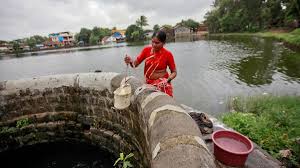
- 30 Dec 2024
Introduction: Groundwater Crisis and Agriculture
- India's Agricultural Dependence on Groundwater: India is a leading producer of water-intensive crops like rice, wheat, and pulses. The country’s agricultural sector heavily depends on groundwater for irrigation, especially for paddy cultivation.
- Over-exploitation of Groundwater: Groundwater extraction for irrigation is increasingly unsustainable, threatening agricultural sustainability in the long term.
Rising Groundwater Usage and Its Implications
- Population Growth and Groundwater Use: Between 2016 and 2024, global population grew from 7.56 billion to 8.2 billion, and India’s population rose from 1.29 billion to 1.45 billion. Concurrently, groundwater used for irrigation increased from 38% in 2016-17 to 52% in 2023-24, exacerbating the water crisis.
- Over-extraction in Major Paddy-Producing States: States like Rajasthan, Punjab, and Haryana have witnessed severe over-exploitation of groundwater for irrigation.
- Rajasthan: Highest groundwater salinisation (22%) despite receiving the highest average rainfall (608 mm) among these states.
- Punjab and Haryana: Lesser groundwater salinity due to canal irrigation and micro-irrigation systems.
Impact of Excessive Fertilizer Use on Groundwater Quality
- Soil Salinity and Groundwater Contamination: Excessive use of fertilizers, particularly for paddy cultivation, increases soil salinity and contributes to groundwater contamination.
- Toxic Chemicals in Groundwater: Nitrate contamination, caused by nitrogen-based fertilizers, and uranium contamination due to phosphate fertilizers are key concerns in states like Maharashtra, Telangana, Andhra Pradesh, and Tamil Nadu.
- Health Risks: Contaminated groundwater poses health risks such as thyroid disorders, cancer, and dental fluorosis, along with reduced agricultural productivity.
Projected Impact on Future Groundwater Availability
- Unsustainable Groundwater Levels: The Central Groundwater Board (CGWB) reports that if current practices continue, over half of the districts in Punjab could face groundwater depletion. Similarly, 21-23% of districts in Haryana and Rajasthan may experience a similar crisis.
- Population Growth and Water Scarcity: With India’s population expected to reach 1.52 billion by 2036, the need for sustainable groundwater management becomes even more critical.
Government Initiatives for Groundwater Management
- National Mission for Sustainable Agriculture (2014): Promotes sustainable practices like zero tillage, cover cropping, and micro-irrigation for efficient water and chemical use.
- Pradhan Mantri Krishi Sinchai Yojana (2015): Aims to boost irrigation efficiency through drip and sprinkler irrigation methods.
- Atal Bhujal Yojana (2019): Targets efficient groundwater management in water-stressed states like Gujarat, Haryana, Rajasthan, Maharashtra, and Uttar Pradesh.
- Success of Government Initiatives: CGWB data shows that the percentage of districts with unsustainable groundwater levels dropped from 23% in 2016-17 to 19% in 2023-24.
Role of State Governments in Groundwater Management
- State-Level Initiatives: States with unsustainable groundwater levels must take proactive measures to manage water resources efficiently.
- Example - Odisha: Odisha's Integrated Irrigation Project for Climate Resilient Agriculture emphasizes irrigation efficiency and climate-smart practices, supported by World Bank funding.
- Encouraging Resource-Efficient Agriculture: States with safe groundwater levels, like Chhattisgarh, Bihar, Jharkhand, Telangana, and Odisha, should adopt water-efficient practices to protect groundwater resources.
Conclusion: Ensuring Agricultural Sustainability and Water Security
- Need for Urgent Action: Scaling up efforts to improve irrigation practices and groundwater management is crucial to securing India’s agricultural future.
- Global Food Security: Protecting groundwater resources will not only ensure water security within India but also contribute to global food security amid climate challenges.
- Blueprint for Sustainable Agriculture: States like Odisha are providing a model for sustainable water management, which can be replicated across water-stressed regions in India.
Agrarian Crisis in India
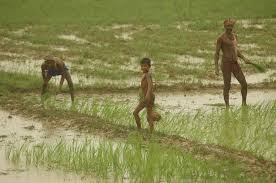
- 15 Dec 2024
Introduction
- Supreme Court Committee Report: A high-level committee, appointed by the Supreme Court in September 2024, submitted its interim report on November 21, 2024, highlighting the severe distress in India's agricultural sector.
- Key Focus Areas:
- Income crisis faced by farmers
- Rising debt burden
- Farmer suicides
- Stagnation in agricultural growth
- Impact of climate change
Key Findings of the Supreme Court Committee Report
Income Crisis in Indian Agriculture
- Daily Earnings: Farmers earn an average of just Rs 27 per day from agricultural activities, a meager income that makes it impossible to sustain a decent standard of living.
- Average Household Income: Agricultural households have an average monthly income of Rs 10,218, far below the basic threshold for a decent life.
Escalating Debt Burden
- Institutional Debt: In 2022-23, Punjab's institutional debt was Rs 73,673 crore, and Haryana's was Rs 76,630 crore.
- Non-Institutional Debt: This burden is further exacerbated by non-institutional debt, contributing 21.3% of total debt in Punjab and 32% in Haryana.
Farmer Suicides
- High Suicide Rates: Over 400,000 farmers and agricultural workers have committed suicide since 1995, primarily due to escalating debt and financial despair.
- Survey Findings: In Punjab, a survey found 16,606 suicides among farmers and farm workers between 2000 and 2015.
Stagnation in Agricultural Growth
- Growth Rates: Between 2014-15 to 2022-23, Punjab's agricultural growth was a mere 2% per year, and Haryana’s was 3.38%, far below the national average.
Disproportionate Employment
- Workforce Participation: 46% of India’s workforce is employed in agriculture, but it contributes only 15% to national income. Many farmers face disguised unemployment and underemployment.
Impact of Climate Change
- Environmental Degradation: Climate change, water depletion, erratic rainfall, and soil degradation are further destabilizing the agricultural sector and threatening food security.
Challenges Faced by the Agricultural Sector
1. Limited Access to Credit and Finance
- Small Farmers: 86% of Indian farmers are small and marginal, struggling to access institutional credit, which limits their ability to invest in modern agricultural inputs.
2. Fragmented Landholdings
- Small Landholdings: The average landholding is 1.08 hectares, insufficient for large-scale, efficient farming, limiting the adoption of modern agricultural techniques.
3. Outdated Farming Practices
- Traditional Methods: Many farmers continue using traditional, inefficient farming practices due to limited access to modern technology.
4. Water Scarcity and Irrigation Issues
- Dependence on Monsoons: 60% of cropped area is rainfed, and only 52% of gross sown area is irrigated, exacerbating vulnerability to droughts and erratic rainfall.
5. Soil Degradation and Erosion
- Degraded Land: 30% of India's agricultural land is affected by soil degradation, leading to lower productivity and reduced resilience to pests.
6. Inadequate Agricultural Infrastructure
- Post-Harvest Losses: Insufficient storage, cold chain, and rural infrastructure result in 15-20% post-harvest losses, further reducing farmers' income.
Government Schemes for Farmers' Welfare
- PM Kisan Samman Nidhi Yojana: Direct income support for farmers.
- PM Fasal Bima Yojana (PMFBY): Crop insurance scheme.
- PM Krishi Sinchai Yojana (PMKSY): Irrigation schemes to enhance water availability.
- e-NAM: National electronic market for better price realization.
- Agriculture Infrastructure Fund: Financial support for infrastructure development.
- Promotion of Farmer Producer Organizations (FPOs): Empowering farmers through collective marketing and production.
Recommendations for Addressing the Crisis
1. Loan Waivers and Debt Relief
- Debt Alleviation: Immediate measures to reduce the crushing debt burden through loan waivers, a key factor behind farmer suicides.
2. Legal Recognition of Minimum Support Price (MSP)
- MSP Protection: Granting legal backing to MSP to ensure farmers receive a fair price for their produce, reducing price volatility and income insecurity.
3. Promotion of Sustainable Farming
- Organic Farming: Encouraging organic farming and crop diversification to improve soil health and reduce dependency on a few staple crops.
- Climate-Resilient Agriculture: Adopting water-efficient practices, drought-resistant crops, and sustainable farming techniques.
4. Agricultural Marketing Reforms
- Market Efficiency: Improving the agricultural marketing system by establishing farmer-friendly markets and reducing intermediaries to ensure better price realization.
5. Rural Employment Generation
- Diversification: Creating non-agricultural employment opportunities in rural areas through skill development and promoting agro-based industries.
6. Climate Adaptation Measures
- Water Management: Enhancing water management systems and promoting rainwater harvesting.
- Resilience to Climate Change: Investing in climate-resilient infrastructure and farming technologies.
Implications of the Findings
Economic Impact
- Agricultural Decline: Continued neglect of the agricultural sector poses a risk to India's economy, potentially leading to long-term economic instability and increased rural-urban migration.
Food Security
- Threat to National Food Security: Declining agricultural productivity, exacerbated by climate change and inadequate reforms, threatens the country’s ability to meet food demands.
Social Stability
- Farmer Suicides and Unrest: The ongoing crisis, marked by widespread suicides and growing despair, risks social instability and unrest, particularly in rural regions.
Conclusion: Urgent Need for Reform
The committee’s report underscores the critical need for comprehensive reforms in India’s agricultural sector to alleviate the crisis. Immediate action is required to address the debt burden, improve incomes, and ensure sustainable agricultural practices. Legal reforms like MSP recognition and debt relief, along with investments in infrastructure and climate resilience, are key to securing a stable future for Indian agriculture.
National Agriculture Code (NAC)
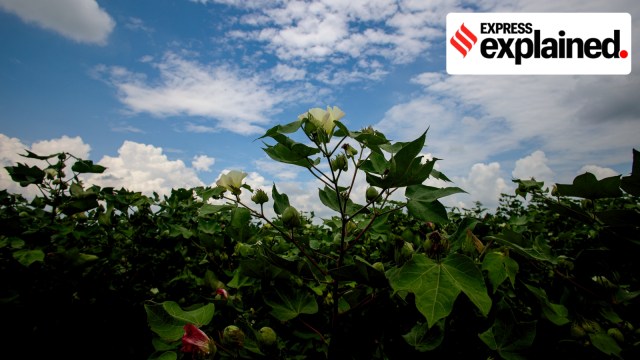
- 07 Oct 2024
Introduction
The Bureau of Indian Standards (BIS) is in the process of developing the National Agriculture Code (NAC), which aims to establish standardized practices across the agricultural sector. This initiative mirrors existing frameworks such as the National Building Code and the National Electrical Code.
Purpose of the National Agriculture Code
The NAC seeks to standardize agricultural practices throughout the entire agricultural cycle, ensuring consistency and quality in farming operations. It will serve as a comprehensive guide for farmers, agricultural institutions, and policymakers.
Structure of the NAC
The NAC will be divided into two main parts:
- General Principles: Applicable to all crops, providing a foundational framework.
- Crop-Specific Standards: Tailored standards for key crops such as paddy, wheat, oilseeds, and pulses.
Coverage of the NAC
The code will encompass a wide range of agricultural processes, including:
- Agricultural Cycle: From crop selection to post-harvest operations.
- Post-Harvest Operations: Including standards for storage, processing, and traceability.
- Emerging Practices: Guidelines for natural and organic farming, as well as the integration of Internet-of-Things (IoT) technologies.
- Input Management: Recommendations for the use of fertilizers, pesticides, and weedicides.
Objectives of the National Agriculture Code
The BIS outlines several key objectives for the NAC:
- Standardization: Create a national code that reflects the diverse agro-climatic zones and socio-economic conditions across India.
- Quality Culture: Act as a reference for policymakers and regulators to enhance agricultural quality.
- Guidance for Farmers: Provide a practical guide to assist farmers in making informed decisions.
- Integration of Standards: Combine existing Indian standards with agricultural practices.
- Modernization: Emphasize aspects such as SMART farming, sustainability, and documentation.
- Capacity Building: Support training programs conducted by agricultural extension services.
Implementation Timeline
The BIS has established working panels comprising university professors and research organizations to draft the NAC, with a target completion date set for October 2025. Following this, training programs for farmers will be organized, facilitated by universities with financial assistance from the BIS.
Standardized Agriculture Demonstration Farms (SADF)
In conjunction with the NAC, the BIS is launching Standardized Agriculture Demonstration Farms (SADFs) at select agricultural institutions. These farms will serve as experimental sites to test and implement agricultural practices aligned with Indian standards. Partnerships with prominent agricultural institutes are being formalized through Memorandums of Understanding (MoUs), with two agreements already signed, including one with Govind Ballabh Pant University of Agriculture and Technology.
Significance of the NAC
- Uniform Standards: Promotes best practices in diverse agricultural environments.
- Stakeholder Guidance: Provides a structured framework for informed decision-making.
- Support for Modern Techniques: Encourages the adoption of innovative practices and technologies.
- Farmer Empowerment: Facilitates training and capacity building for enhanced productivity.
Challenges and Limitations
- Implementation Barriers: Standardizing practices across varied climates and soil conditions may prove challenging.
- Adoption Resistance: Smaller farmers might struggle with resource availability or awareness of new practices.
- Dynamic Agricultural Needs: The need for frequent updates to the NAC to keep pace with evolving agricultural trends.
- Infrastructure Constraints: Rural areas may lack the necessary infrastructure to effectively implement NAC guidelines.
Conclusion
The National Agriculture Code represents a pivotal move towards modernizing and standardizing agricultural practices in India. While it aims to enhance productivity and sustainability, its success hinges on effective implementation, farmer engagement, and ongoing updates to meet the changing landscape of agriculture.
Drone Technology in Agriculture
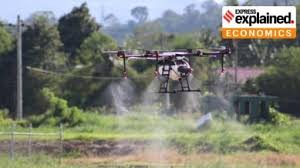
- 02 Sep 2024
In News:
Farmers in Bhagthala Khurd, Kapurthala, and Amritsar are increasingly using drones to apply pesticides to their maize and moong crops. Drones, also known as unmanned aerial vehicles (UAVs), are advanced flying machines that can be operated either autonomously or via remote control.
Drone Technology in Agriculture
While the use of drones in Indian agriculture is still emerging, it shows great potential. In Punjab, 93 out of the 100 drones provided to farmers by the Indian Farmers Fertiliser Cooperative (IFFCO) under the Centre’s ‘NAMO Drone Didi’ scheme are already in operation. Each drone, costing Rs 16 lakh, is equipped with a 12-litre water tank.
Benefits
- Health Protection: Drones minimize farmers' direct exposure to harmful pesticides, reducing the risk of health issues like cancer and kidney problems.
- Efficiency: Drones can spray an acre in just 5-7 minutes, significantly faster than the several hours required for manual application. They ensure a uniform application, which can enhance crop yields.
- Data Collection: Drone data helps pinpoint areas requiring attention, leading to better crop management and increased profits.
- Nano Fertilisers: Drones effectively handle nano fertilisers, ensuring even distribution of these small quantities that are difficult to spread manually.
- Pest Control: Drones enable timely application of pesticides during infestations of pests such as pink bollworms, locusts, and whiteflies.
- Environmental Benefits: Drones improve nutrient absorption from nano fertilisers by up to 90%, reducing runoff and pollution. Leaf-based application is also less polluting than soil-based methods.
- Water Conservation: Drones reduce water usage by up to 90% compared to traditional methods.
- Cost Reduction: They decrease the need for manual labor and reduce pesticide and chemical use, lowering overall costs.
- Additional Uses: Drones are also used to drop seed balls (a mix of soil and cow dung with seeds) for potential reforestation projects.
Challenges
- Job Loss: The use of drones may reduce demand for manual labor, affecting job opportunities for laborers.
- Knowledge and Training: Farmers may lack the necessary skills and training to operate drones effectively.
- Cost: The high cost of drones can be a significant barrier for many farmers.
- Regulatory Barriers: Regulatory challenges may complicate the adoption of drones in agriculture.
Initiatives
- Digital India Campaign: Aims to enhance digital infrastructure and provide training.
- Indian Council of Agricultural Research (ICAR): Promotes precision agriculture technologies, including drones.
- Production Linked Incentive (PLI) Scheme: Offers Rs. 120 crore (US$ 14.39 million) to incentivize domestic drone manufacturing and reduce import reliance.
- Sub-Mission on Agricultural Mechanization (SMAM): Provides financial aid to farmers purchasing drones, making technology more accessible.
- NAMO Drone Didi Scheme: Launched to empower women Self-Help Groups (SHGs) and provide access to modern agricultural technology.
- Support and Training: Efforts are underway to offer training and support to farmers to overcome adoption barriers.
Conclusion and Way Forward
Drone technology holds the promise of transforming agriculture by boosting efficiency, yields, and cost-effectiveness. In Punjab, where traditional manual methods have prevailed, drones offer a new approach to pesticide and fertiliser application. It is essential for farmers and policymakers to work together to address challenges and ensure that the benefits of drones are fully realized while mitigating any potential drawbacks.
The role of district agro-met offices in supporting farmers
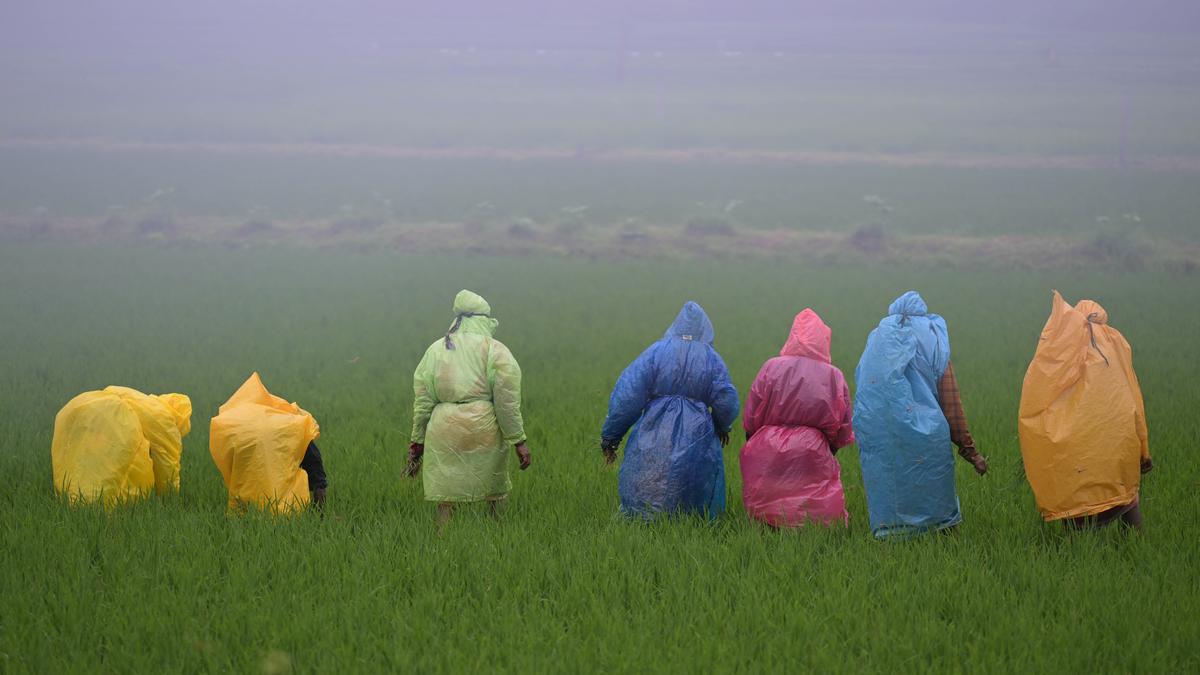
- 10 Sep 2024
In News:
- Last week, PTI reported that the India Meteorological Department (IMD) is planning to revive District Agro-Meteorology Units (DAMUs) under the Gramin Krishi Mausam Sewa (GKMS) scheme.
Background:
- The IMD established 199 DAMUs in 2018 in collaboration with the Indian Council of Agricultural Research.
- The aim was to use weather data to prepare and disseminate sub-district level agricultural advisories. In March, DAMUs were shut down following an order issued by the IMD.
Why are agro-met units important?
- Around 80% of farmers in India are small and marginal. They largely practise rain-fed agriculture in the backdrop of a decades-long farm crisis that is now overlaid with climate change-related weather variability.
- The DAMUs were located within Krishi Vigyan Kendras (KVKs). Scientists and researchers trained in meteorology and agriculture were recruited as DAMU staff. They used weather data provided by the IMD like rainfall, temperature and wind speeds to prepare agricultural advisories related to sowing and harvesting, usage of fertilizers and pesticides, irrigation etc.
- These advisories were sent to millions of farmers across the country free-of-cost in local languages twice a week. They were shared via text messages, WhatsApp groups, newspapers and also through in-person communication from DAMU staff and KVK officers.
- Since these advisories provided weather information in advance, they helped farmers plan activities like irrigation. They also served as early warnings for extreme events like droughts and heavy rainfall. Many studies conducted over the years have stressed the benefits of agro-met advisories.
Why were DAMUs shut down?
- According to an Article-14 report, the NITI Aayog misrepresented the role of District Agricultural Management Units (DAMUs) and advocated for their privatization. The report claims that NITI Aayog inaccurately stated that agro-met data was automated, thereby diminishing the role of DAMU staff. In reality, DAMU staff were crucial in creating agricultural advisories based on IMD weather data, which were disseminated to farmers in local languages. NITI Aayog also proposed monetizing these services, contrasting with the current free provision of agro-met information to all farmers.
- A policy brief from the National Institute of Advanced Studies (NIAS), Bangalore, released in August, highlights that localized and accessible advisories from District Agricultural Management Units (DAMUs) have significantly improved farmers' responses to climatic variations in the Kalyana-Karnataka region. This has led to increased yields and incomes. The brief recommends reconsidering the decision to discontinue DAMUs and suggests exploring ways to enhance their effectiveness and presence.
What about private players?
Currently, a few private companies offer weather advisories, but their services are often too costly for small and marginal farmers. Dr. M. N. Thimmegowda, a professor at the University of Agricultural Sciences noted that annual subscriptions can cost ?10,000 per crop, leading to expenses of ?20,000-40,000 for vegetable and cereal growers, and up to ?60,000-80,000 for specialized advisories. Additionally, there is concern that these companies may provide biased recommendations for fertilizers and pesticides, favoring certain brands.
